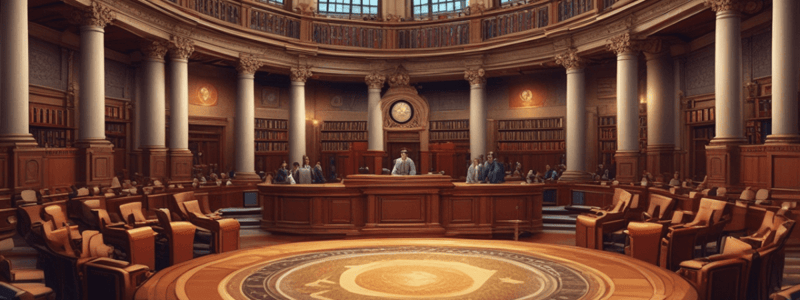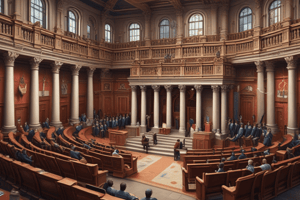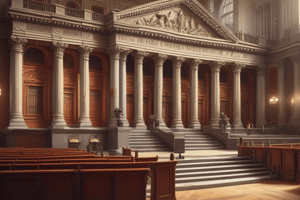Podcast
Questions and Answers
What are the two main purposes of the rule against retrospective legislation?
What are the two main purposes of the rule against retrospective legislation?
- Ensures predictability and legality, 2. Prevents unfair and unreasonable results
What is the difference between 'retroactive' and 'retrospective' legislation?
What is the difference between 'retroactive' and 'retrospective' legislation?
Retroactive ('strong') legislation operates backwards in time, while retrospective ('weak') legislation only looks backwards in time.
What is a 'legal fiction' and a 'deeming clause' in the context of retrospective legislation?
What is a 'legal fiction' and a 'deeming clause' in the context of retrospective legislation?
A legal fiction and a deeming clause can be used to attach new consequences to a past event through retrospective legislation.
What are the five main obstacles to retrospective legislation identified in the text?
What are the five main obstacles to retrospective legislation identified in the text?
What are the two exceptions to the presumption against retrospective legislation?
What are the two exceptions to the presumption against retrospective legislation?
How does the Constitution affect the application of retrospective legislation?
How does the Constitution affect the application of retrospective legislation?
What principle does R v Detody case establish regarding legislation?
What principle does R v Detody case establish regarding legislation?
Explain the concept of non-textual amendment.
Explain the concept of non-textual amendment.
What does the common law principle of implied powers entail?
What does the common law principle of implied powers entail?
What is meant by modificative interpretation by the courts?
What is meant by modificative interpretation by the courts?
How can the court exercise judicial discretion in constitutional review?
How can the court exercise judicial discretion in constitutional review?
What is the difference between textual and non-textual amendment of legislation?
What is the difference between textual and non-textual amendment of legislation?
What happens if a court decides that Act Y prevails over Act X?
What happens if a court decides that Act Y prevails over Act X?
What is the legal principle of cessante ratione legis, cessat et ipsa lex?
What is the legal principle of cessante ratione legis, cessat et ipsa lex?
What is the presumption regarding how legislation should be interpreted?
What is the presumption regarding how legislation should be interpreted?
What is the principle of generalia specialibus non derogant?
What is the principle of generalia specialibus non derogant?
If two acts conflict, how should they be interpreted?
If two acts conflict, how should they be interpreted?
What is the presumption regarding whether the legislature intended to repeal or amend an earlier act?
What is the presumption regarding whether the legislature intended to repeal or amend an earlier act?
What does 'legislation meaning' refer to?
What does 'legislation meaning' refer to?
What happens when an amending law is not in force yet when other legislation is repealed?
What happens when an amending law is not in force yet when other legislation is repealed?
What does Section 12(1) of the Interpretation Act state?
What does Section 12(1) of the Interpretation Act state?
What is the difference between adoption and promulgation in the legislative process?
What is the difference between adoption and promulgation in the legislative process?
What is the purpose of Section 12(2)(b)-(e) of the Interpretation Act?
What is the purpose of Section 12(2)(b)-(e) of the Interpretation Act?
What is the enacting clause, and what does it indicate?
What is the enacting clause, and what does it indicate?
What is required for an implied repeal to occur?
What is required for an implied repeal to occur?
What is the presumption regarding the application of legislation in relation to time?
What is the presumption regarding the application of legislation in relation to time?
What does Section 149 of the Constitution allow?
What does Section 149 of the Constitution allow?
What is one of the reasons given for the rule that legislation only applies to the future?
What is one of the reasons given for the rule that legislation only applies to the future?
According to the Cats Entertainment case, what can relevant functionaries do before an Act is in force?
According to the Cats Entertainment case, what can relevant functionaries do before an Act is in force?
Flashcards are hidden until you start studying



